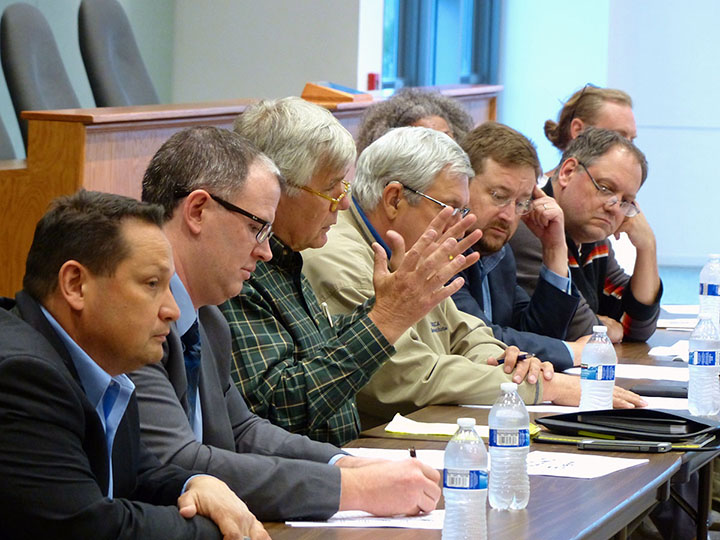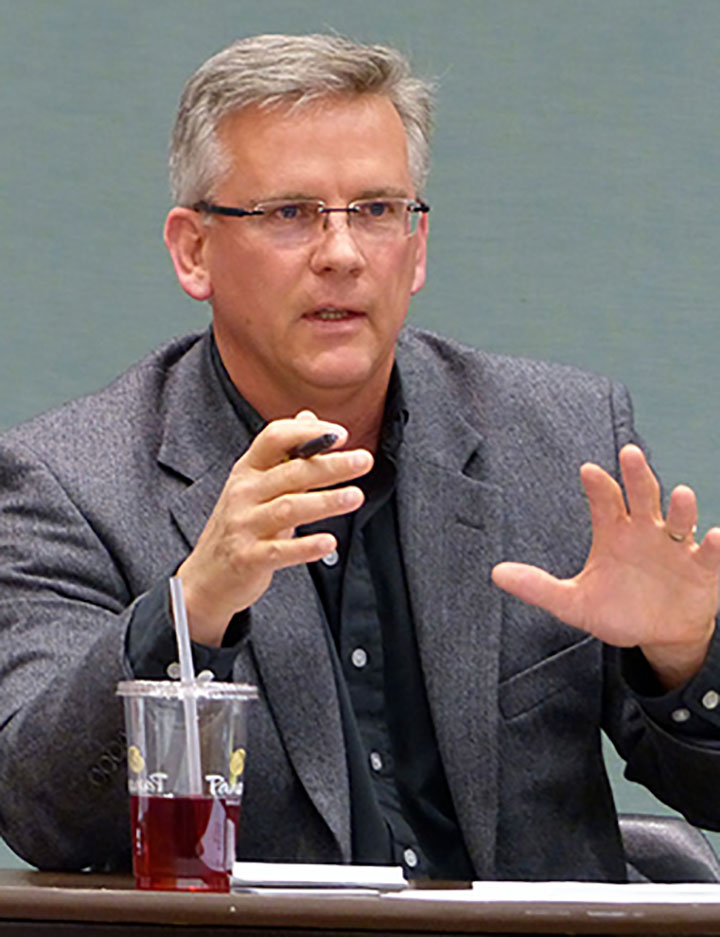
A panel of professionals came together April 28 to open the lines of dialogue on what it would take to move from a fossil fuel based economy to a renewable energy economy. Experts discussed the impact the transition would have on labor and whether the transition could sustain good paying, union jobs. Jennifer Rice/staff photographer

By Jennifer Rice
Managing Editor
Thursday, May 12, 2016
Email Jennifer Rice at: jen@foxvalley
labornews.com
WARRENVILLE — When it comes to good paying, union jobs and a healthy environment, the goal is to have both. If we can’t have both, we should have neither.
This month, a coalition of environmental organizations, spearheaded by 350.org, will hold a series of protests at energy extraction, transporting and refining sites across the U.S. and around the world.
360.org calls for the “rapid, just transition from the fossil fuel economy of the past, to the 100 percent renewable and clean energy future that climate justice demands.”
In the midwest, renewable supporters will protest the USW-represented BP Whiting oil refinery May 15, which is a few blocks from Chicago city limits.
To open the dialogue between labor and industry, Northern Illinois Jobs with Justice hosted a panel of experts April 28 to discuss what the labor impact would be to shift from a fossil fuel based economy to a renewable energy economy.

Advertisement
The panel of professionals represented organized labor, environmental justice issues, renewable energy training, and the health service industry.
Transferring good paying, union jobs from the fossil fuel industry into the renewable industry is a huge concern for organized labor.
USW Local 12775 President Vernon Beck represents 1,600 Northern Indiana Public Service Company (NIPSCO) union workers. Eighty four percent of his state uses coal for electricity. “If you go across the nation, there’s about 175,000 workers that are directly affected by the production of coal, whether it’s miners; railroad workers; barge workers; or the 1,600 members that I’m a part of. That doesn’t count the tens of thousands of other workers indirectly affected by coal production,” Beck said.

USW Local 12775 President Vernon Beck has spent 38 years in the utility business. He is concerned with the efficiency and amount of renewables, as well as a lack of funding to maintain the infrastructure needed to transport gas. Jennifer Rice/staff photographer
A disturbing figure he presented was an estimated 2 percent unionized workforce in solar manufacturing. “This tells me this industry doesn’t sustain workers in terms of benefits and wages. If we’re going to move from one industry to another, and it makes us a poorer nation, than we’re going to fight it,” Beck explained.
Laborers’ Local 582 Business Manager Corey Johnson said his job is to get his members working. He said it’s irrelevant if laborers are building bridges, clean energy plants or fossil fuel plants.
“Right now, the fossil fuels industry is the only industry really making solid investments in energy creation. Unfortunately, fossil fuels are a big part of what America is addicted to right now,” Johnson explained.

Advertisement
Right now, the biggest hurdle is that major corporations are not investing in green energy. To get the transition rolling, change needs to start with the big hitters, in the form of lobbying for industry incentives and investment in clean energy technologies, such as carbon capture utilization and storage. Do navigate to this website to find out the best storage facilities that satisfies all your needs. The federal government also needs to push for a national energy policy.
The most manageable hurdles securing funding for upgrading infrastructure and educating the public that renewables are a positive fuel.
Harry Ohde, assistant director, IBEW-NECA Technical Institute was the most optimist panel member. He teaches union members electrical code, print reading, and renewable energy at the IBEW-NECA Technical Institute in Alsip.
“Efficiency on solar panels is rising, and the price is going down. We need to get people educated, and get their blood going — that’s what I do,” he explained.
With an open dialogue, charting a path for economic and environmental sustainability can be achieved and union members can look forward to a sustainable, middle-class income to build a career, instead of just having a job.
